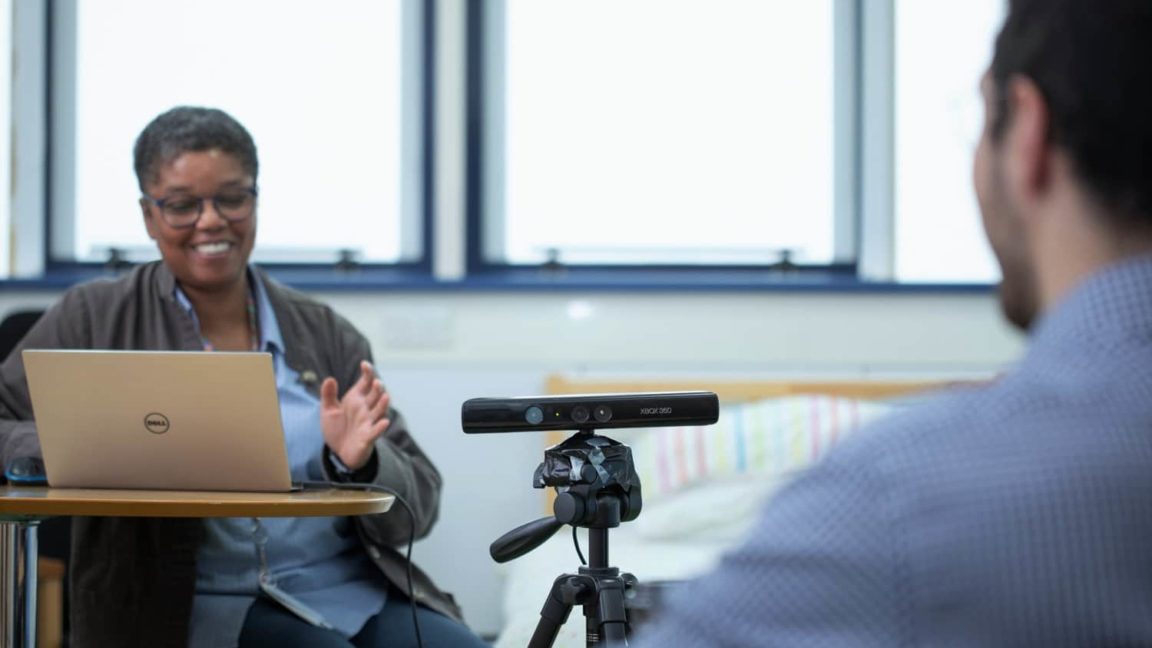Virtual Physiotherapist could improve stroke recovery
A system developed by researchers at Leeds Beckett University aims to offer a ‘Virtual Physiotherapist’ service to patients recovering from stroke.
Through Grow MedTech the research team has been able to make critical connections with healthcare professionals and patient groups, as well as benefiting from funding for user-testing and development work.
Rehabilitation following a stroke can be extremely tough for patients, both mentally and physically. Physiotherapy sessions can help regain strength and movement – but regular exercise is key to success and this can be hard if patients struggle to attend clinics, or if they have to motivate themselves to maintain an exercise regime at home.
Tackling these challenges could alleviate a significant burden from the NHS: around 1.2 million people in the UK are currently living with the after effects of stroke and this is likely to rise as stroke increases among middle-aged adults. Clinical and social care costs amount to around £1.7 billion per year.
The Virtual Physiotherapist enables patients to carry out simple arm exercises at home and track their progress.
Using the system is as simple as sitting in front of a computer and carrying out the prescribed task, such as lifting a glass to drink or moving an object across a table.
Artificial intelligence in the computer’s software tracks the movements, building up a picture of progress over time.
Direct access to clinicians and patients
The sort of technology employed by the Virtual Physiotherapist is likely to become increasingly available within healthcare settings. Its success, however, is entirely dependent on whether or not patients and physicians are inclined to make use of it.
Grow MedTech’s emphasis on involving end users in technology development from an early stage means the Leeds Beckett team have been able to make useful connections to guide development work.
Through Translate MedTech, Grow MedTech’s predecessor organisation, lead research Professor Dorothy Monekosso was able to make valuable links with clinicians and assistive technology experts through a network of clinical professionals.
“We had developed a prototype using funding from Royal Academy of Engineering and the University of Malaysia that showed how patients could use the system – but what we were lacking was input from clinicians about whether they saw a use for this sort of technology, and how they would use it,” says Professor Monekosso.
“Through consultations facilitated by Grow MedTech, we were able to get some really positive feedback, but also lots of development ideas.”
“Through the Grow MedTech and Translate MedTech events I’ve attended, I now have a wide group of clinical personnel in the region who are interested in helping us take this forward.
Grow MedTech’s support goes much further than just access to funding. Without access to NHS colleagues, it doesn’t matter how good the system or the technology – it just won’t go anywhere!”
Expressions of interest from clinical colleagues also helped the team secure Grow MedTech funding to further test the Virtual Physiotherapist.
During this phase, Grow MedTech Technology Innovation Officer Cat Colquhoun introduced Professor Monekosso to colleagues in Assisted Living Leeds, which draws together Leeds City Council’s assistive technology services and information.
“Through Assisted Living Leeds we were able to work directly with a group of stroke survivors and have them test out the system and give their opinion about how – and whether – they would use it,” says Professor Monekosso.
Finding rewards that work
After confirming the clinical use and interest from patients, the team can explore in more depth what incentives will really encourage users to maintain regular use of the Virtual Physiotherapist.
A Proof of Market grant from Grow MedTech is enabling more work to be done with Assisted Living Leeds, working with patient groups to test different prototypes.
“We need to make sure we understand our patient’s motivation and how we can harness it,” says Professor Monekosso. “For example, when people play computer games, they might get coins or badges if they play regularly. Is that the sort of reward that would motivate our patients? That’s what we hope to find out in this next phase of research.”

